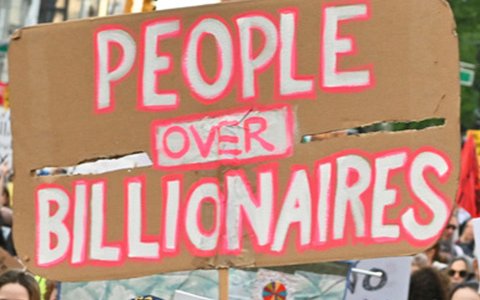Learn what oligarchy means, how it shapes power, and why growing inequality raises concerns about democracy in the US.
For years, Oxfam—along with advocates and activists around the world—have argued that the extreme concentration of wealth leads to the extreme concentration of power, allowing a super-rich few to tighten their control over governments, economies, and media.
When power belongs to just a few, democracy suffers as extreme inequality worsens. Oligarchy isn’t created overnight–decades of policies and politics across parties in favor of giant corporations and the super-rich have got us here.
Americans should brace for even higher levels of inequality under this Trump administration. This administration has a blueprint that is taking us deeper into an oligarchy that threatens democracy, freedoms, and a more equal future.
What is oligarchy?
Oligarchy is about the ability of an ultra-wealthy elite to shape political decision-making in ways that increase their wealth — and power. Oligarchic power is ultimately rooted in wealth, and the influence of oligarchs is enabled by huge concentrations of it.
- Given the massive amount of wealth and power that the ultra-rich have amassed, coupled with their influence over political and economic decision-making in the U.S., it’s only fitting to use the term for the direction that America appears headed.
- The ultra-richest segments in the U.S. control a greater portion of wealth than they did during the Gilded Age. A new Oxfam analysis shows that the wealth of the 10 richest U.S. billionaires surged by $698 billion in the past year.
- The U.S. has contended with oligarchy in the past. In 1948, Supreme Court Justice William O. Douglas argued that, “Power that controls the economy should be in the hands of elected representatives of the people, not in the hands of an industrial oligarchy”.
What does oligarchy look like around the world?
For starters, let’s look at who holds power in our economy. Industries from technology to food to pharmaceuticals have become deeply consolidated by just a handful of corporations, in turn giving outsized power to a handful of owners and executives.
- Over half of the world’s largest media companies now have billionaire owners.
- Eight of the top 10 AI companies are billionaire-run, with just three commanding nearly 90 percent of the generative AI chatbot market.
- Nearly 50 new health and pharmaceutical billionaires were created last year, reaping massive profits for their rich owners and shareholders.
What about the U.S. electoral process? Don’t we all have equal power in that system? Not quite. Just 100 billionaire families poured a record-breaking $2.6 billion into U.S. federal elections in 2024—one in every six dollars spent by all candidates, parties and committees.
Right now, we’re getting a view into just how the ultra-rich have bought themselves a seat—if not a couch—in the Oval Office. Elon Musk, Mark Zuckerberg, and Jeff Bezos are a few examples of the wealthy elite who not only cozied up to President Trump to influence policy, but have also benefited under his administrations. Trump has had over a dozen billionaires in this administration — the wealthiest in history.
Trump’s blueprint for new oligarchy: three things to watch
There is so much the Trump administration is doing to fuel inequality.
- First is a massive upward redistribution of wealth from everyday people, chiefly through massive tax giveaways to the ultra-rich and to mega-corporations. In 2027, President Trump’s so-called “Big Beautiful Bill” is forecast to reduce the tax bill of the those in the highest-earning 0.1 percent by $311,000 each. At the same time, it slashed vital safety-net programs and increased taxes on households making less than $15,000 annually. That won’t just give the ultra-rich more wealth, but more power.
- Second is cutting away the public programs that we all rely upon, and to take it a step further, privatizing programs to give them to profit-making corporations. The “Big Beautiful Bill” throws more than 10 million people off of Medicaid, and millions of families could be left without the food assistance they need.
- And third is taking a sledgehammer to the rules and referees that protect ordinary people from excessive corporate and monopoly power. Bodies like the Federal Trade Commission and Consumer Financial Protection Bureau are there to hold corporations from pharma to banks to account, but the Trump administration is intent on weakening their power. This is great news for already powerful monopolies–and bad news for everyone else.
"This is the price of oligarchy: a society that is sicker, hungrier, and poorer,” said Abby Maxman, CEO and president of Oxfam America.
How do we fight back against oligarchy?
We must resist the rule of the super-rich. It’s time for bold action to reduce inequality, rein in the influence of billionaires and big corporations, and restore real voice, choice, and power back where it belongs—with the people.
Bold and systemic changes such as increasing taxes on the super-rich and corporations, strengthening labor rights, ensuring fair wages, and curbing corporate concentration are key to fighting and reversing the path towards oligarchy. We know these are long-term struggles to win – and we must keep fighting, even as we get pushback from oligarchy. By tackling the roots of poverty and injustice, we can build a more equal future where prosperity is shared, and power is not exclusive to the hands of a few.
If we all work together, a more equal future is possible.




